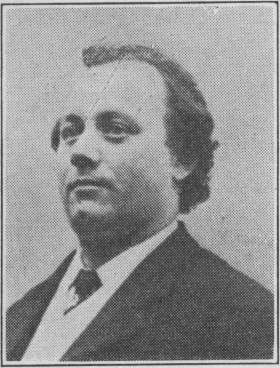 The news that Hans Engelmann is no longer living will be received with sincere regret by thousands of our readers. Probably no more prolific composer of popular salon music ever lived. His compositions numbered in all about three thousand, though not all of these were published under his own name. One is reminded of the indefatigable Czerny, save that whereas Czerny wrote endless pages of music that had no purpose other than to provide technical drill, Engelmann wrote music that was genuinely tuneful. Many of the melodies were of the straightforward, simple kind that always find a way into the hearts of a vast mass of people to whom the classics are a sealed book.
The news that Hans Engelmann is no longer living will be received with sincere regret by thousands of our readers. Probably no more prolific composer of popular salon music ever lived. His compositions numbered in all about three thousand, though not all of these were published under his own name. One is reminded of the indefatigable Czerny, save that whereas Czerny wrote endless pages of music that had no purpose other than to provide technical drill, Engelmann wrote music that was genuinely tuneful. Many of the melodies were of the straightforward, simple kind that always find a way into the hearts of a vast mass of people to whom the classics are a sealed book.Engelmann was born at Berlin, June 16, 1872, and died May 5, 1914. He was the only son of a German military officer of high distinction who rose to be a Private Secretary in the service of Emperor William I. The boy’s education in early childhood was of the best, and he began to study the piano at the age of seven. His father intended him for the medical profession, but nevertheless saw to it that the boy had an excellent musical training, even permitting him to undertake a course of study in piano and composition at Leipsic. The boy’s love of music was so great, however, that it surpassed everything else. His father’s attempt to keep him from a musical career by placing him in a mercantile office merely had the effect of making his love of music stronger than ever.
The young musician came to America in 1891, and settled in Philadelphia. He did not originally intend to reside permanently in this country, but he met with so cordial a reception that he finally decided to remain. At this time he received much assistance, musical and otherwise, from Hermann Mohr, an excellent teacher in Philadelphia, who proved himself to be a true friend. After Hermann Mohr died, however, Engelmann was left to fight his battles alone. He managed to win some distinction as a pianist, and also gathered about him a coterie of pupils, though success did not come without a struggle.
All this time he kept persistently composing, his first published work being The Marine Band March. There soon proved to be a ready market for his compositions, which were found acceptable by both teachers and pupils. This no doubt was largely due to the extremely melodious nature of everything he wrote, whether it was an easy piece for the lower grade or a complicated work intended only for advanced performers. The most popular of all the works that flowed from his pen was unquestionably The Melody of Love.
Composers, like poets, are born and not made. It is possible, of course, for a man to go through an elaborate course of harmony, counterpoint, musical form, etc., and at the end of the course to be able to write music that is “well constructed” and blameless from a theoretical point of view. There are thousands of Doctors of Music in the world to whom the writing of such music is a simple matter. But natural musicians are more rare. Natural musicians are those to whom music is as the breath of life. They think in tones as others think in words and can only find the true expression of their inmost thoughts in the language of music. A course in theory can only develop such gifts to a higher degree of technical perfection, it cannot supply them if they are missing.
Hans Engelmann was unquestionably a natural musician. From him melodies gushed like water from a spring. Engelmann’s music possesses at least one quality which no critic can afford to decry. It possesses the quality of absolute sincerity. Engelmann entered into the life of the people around him and absorbed the life of the everyday world. This he gave out again in his music in good measure. He did what so many of us fail to do—the best he knew how under the circumstances in which he was placed. He interpreted the life he lived honestly into music, and in doing this he gave pleasure to hundreds of thousands —perhaps millions—of people, because he gave them tunes they could understand. Hans Engelmann is dead, and dead before his time, but some at least of his hundreds of melodies will live after him and serve to awaken in many a small heart the love of music which unites all Etude readers, however varied their tastes, in the bonds of true fellowship.
In addition to Melody of Love, mentioned above, among the most popular of Engelmann’s compositions are: Apple Blossoms, Dreamland, Hungarian Rhapsody, Grand Waltz Caprice, Grand Festival March, Bride Kiss Waltz, Lover’s Lane Waltz, Over Hill and Dale, In the Arena, En Route March, Under the Mistletoe When the Lights are Low, Concert Polonaise.



